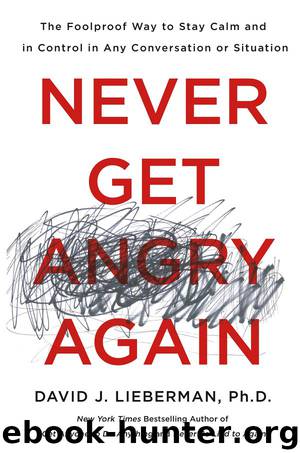Never Get Angry Again by David J. Lieberman

Author:David J. Lieberman
Language: eng
Format: epub
Publisher: St. Martin’s Press
18
Escaping the Trap of Procrastination
Living one’s life with authenticity—meaningful goals aligned with our values—allows us to overcome the single greatest obstacle to moving our lives forward in a significant, purposeful direction: procrastination. Let’s see how this is so.
Scattered or misdirected ambition is as debilitating as inactivity itself. Movement is useless without a plan—we need a place to go and a path to get there. We must not live our lives like the person who shoots an arrow at the side of a barn and then draws a circle around it after it embeds itself. Caring little about what he aims for, he proudly convinces himself and the world that he has succeeded. Many people indeed feel reluctant to plan their lives. They might have a vague idea of what they want to accomplish, yet they shy away from preparing for their future. This is true for two interlacing reasons.
What exactly does planning for the future involve? At the most elementary level, we must acknowledge where we are and then decide where we want to go. The challenge here exists as much in the first half of this process as in the second. Yes, the future holds many unknowns and uncertainties, but our hidden fear lies in not wanting to see where we are. We are afraid to examine our lives too closely and to come face-to-face with who we have become, and with what happened to our finest intentions. The reluctance to set goals and plan for the future relieves us of the burden of self-examination. However, another deep-seated constraint exists.
To move forward, we need to weigh different possibilities and directions our lives can take. To do this, we must know what we are living for. In other words, we must commit. Yet we would rather get lost in the grand scheme of daydreaming than be forced to make choices that will forever define who we are. (It’s interesting that the English word decide has the same etymological root as homicide: the Latin word cadre, meaning “to cut down” or “to kill.”) But we half believe that if we never make a choice, we won’t have to live with failure or regret. Functional magnetic resonance imaging (fMRI) has shown that when we make decisions couched in uncertainty, it stimulates the amygdala—the “fear and anxiety response center.” Our brains are literally afraid of being wrong.1 So rather than move our lives forward, we leave ourselves open to every possibility, with the misplaced hope that the perfect opportunity will present itself. And don’t think that our intelligence or talent shields us against the crime of procrastination. On the contrary, intelligent people can always find endless rationales that support different courses of action.
It’s human nature to want to keep our options open, and as the ego looms larger, it magnifies the fear of commitment—we can’t fail, be wrong, or feel restricted. It always looks for a way out, should we want to escape. Yet the ego built this back door out of fear,
Download
This site does not store any files on its server. We only index and link to content provided by other sites. Please contact the content providers to delete copyright contents if any and email us, we'll remove relevant links or contents immediately.
Should I Stay or Should I Go? by Ramani Durvasula(6780)
Why We Sleep: Unlocking the Power of Sleep and Dreams by Matthew Walker(5637)
Fear by Osho(4083)
Flow by Mihaly Csikszentmihalyi(4047)
Rising Strong by Brene Brown(3777)
Why We Sleep by Matthew Walker(3768)
Too Much and Not the Mood by Durga Chew-Bose(3690)
How to Change Your Mind by Michael Pollan(3669)
The Hacking of the American Mind by Robert H. Lustig(3576)
Lost Connections by Johann Hari(3452)
He's Just Not That Into You by Greg Behrendt & Liz Tuccillo(3298)
Evolve Your Brain by Joe Dispenza(3047)
What If This Were Enough? by Heather Havrilesky(2943)
Resisting Happiness by Matthew Kelly(2882)
Crazy Is My Superpower by A.J. Mendez Brooks(2856)
The Courage to Be Disliked by Ichiro Kishimi & Fumitake Koga(2793)
The Book of Human Emotions by Tiffany Watt Smith(2767)
Descartes' Error by Antonio Damasio(2728)
In Cold Blood by Truman Capote(2680)
